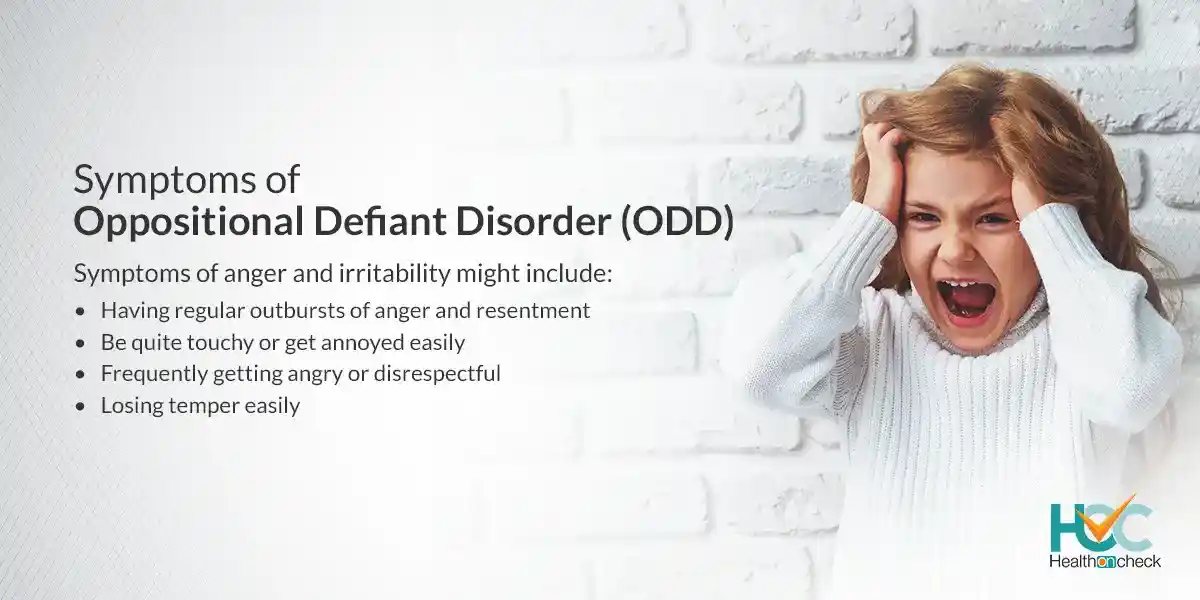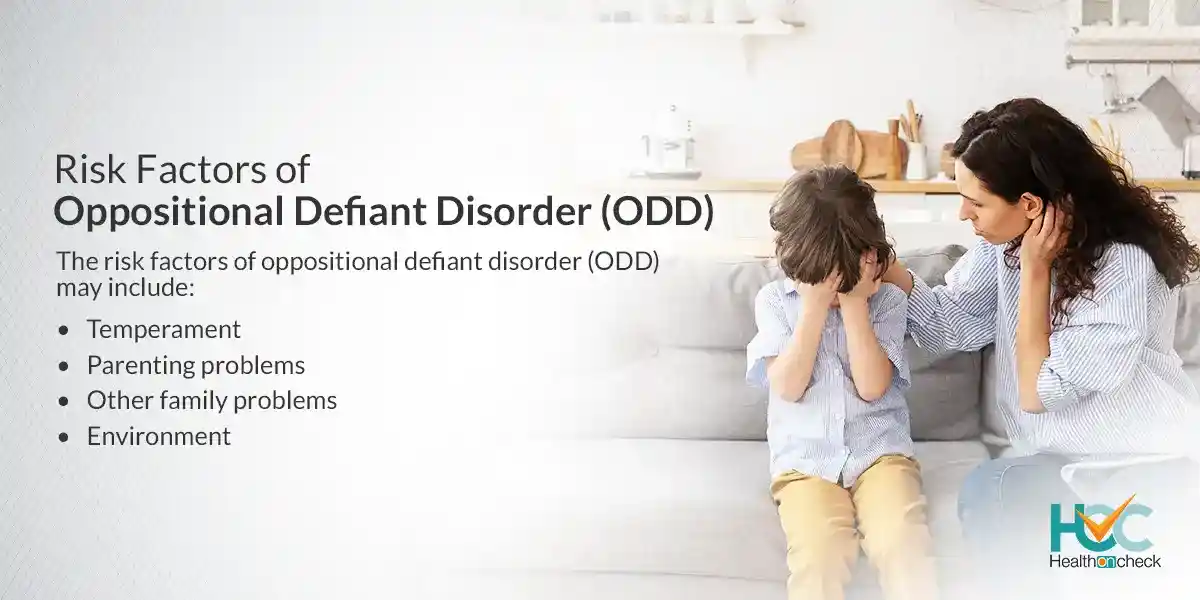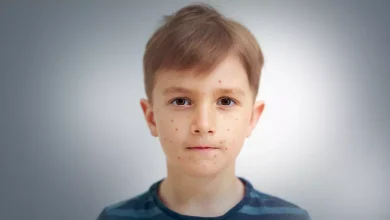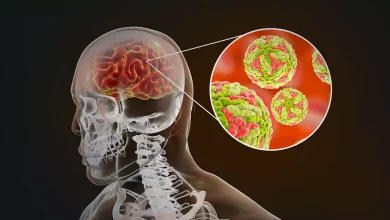ALL about Oppositional Defiant Disorder

What is Oppositional Defiant Disorder (ODD)?
Oppositional defiant disorder (ODD) is a behaviour disorder where your child shows a continuing pattern of uncooperative, defiant, and sometimes hostile behaviour toward the people around them, especially those in authority. This behaviour usually creates problems in your child’s daily work, which include relationships and activities within their family and at school. These emotional and behavioural problems result in severe issues in their family life, social activities, and studies. As a parent, you need not manage a child with ODD alone as you can get help from your doctor along with a mental health professional and a child development expert. Treatment of ODD generally includes learning skills that help to create positive family interactions as well as managing problem behaviours. Other therapies, and possibly medicines, might be required to treat mental health conditions linked with this condition.
What are the Types of Oppositional Defiant Disorder (ODD)?
The types of oppositional defiant disorder (ODD) include:
Stimulus Dependent ODD: Children who have Stimulus Dependent ODD usually suffer from impairing attention-deficit/hyperactivity disorder (ADHD) along with ODD behaviours in various settings. The condition may improve when ADHD is treated.
Cognitive Overload ODD: Children with Cognitive Overload ODD generally face issues with learning, language, and social processing capabilities with ADHD, and are diagnosed with learning disability and anxiety disorder. Such children have executive functioning skills even with low demand conditions and their oppositionality has no clear reason except the resistance to change. They also have poor social perspective-taking abilities, along with being socially awkward.
Fearful ODD: This type includes highly aroused and stress-reactive children, who might be good in different areas but suffer from ODD symptoms if they have the threat of loss or shame, generally with caregivers. Usually, these children have a history of trauma and mistrust of authority; and their behaviours are a reflection of an anxious/ambivalent attachment.
What are the Symptoms of Oppositional Defiant Disorder (ODD)?
Signs and symptoms of oppositional defiant disorder typically start by age 8
The signs and symptoms of ODD can be classified into three categories:
Anger and irritability: Argumentative and defiant behaviour.
Vindictiveness: A large number of children might be moody, get easily frustrated, and have low self-esteem. They also might get involved in drug and alcohol abuse.

Symptoms of anger and irritability might include:
- Losing temper easily.
- Having regular outbursts of anger and resentment.
- Be quite touchy or get annoyed easily.
- Frequently getting angry or disrespectful.
Symptoms of argumentative and defiant behaviour might include:
- Arguing unusually with adults.
- Actively refusing to comply with rules and requests of adults.
- Blaming other people for their own mistakes.
- Deliberately annoying or upsetting others.
Symptoms of vindictiveness might include:
- Being spiteful
- Seeking revenge.
- Uttering mean and hateful things while angry or upset.
What are the Causes of Oppositional Defiant Disorder (ODD)?
There is no known clear reason for oppositional defiant disorder. Causes might involve an amalgamation of genetic and environmental factors including:
Genetics: The natural personality or character of the child also known as temperament might add to the development of this condition. Also, variations in the way nerves and the brain work might be a cause.
Environment: Issues in parenting including a lack of supervision, harsh and inconsistent discipline, or abuse or neglect might add to developing ODD.
What are the Risk Factors of Oppositional Defiant Disorder (ODD)?

The risk factors of oppositional defiant disorder (ODD) may include:
Temperament: Children with temperament including problems in managing emotions, like reacting with strong emotions to various situations or finding it difficult to tolerate frustration might have an increased risk of developing this condition.
Parenting problems: Children who experience parenting problems such as abuse or neglect, hard or inconsistent discipline, or not having proper supervision might have an increased risk of developing this condition.
Other family problems: Children with parents who are unstable or have a parent with a mental health disorder or substance use problem may also have an increased risk of developing ODD.
Environment: Children who live in an unconducive environment such as harsh and inconsistent teaching conditions might have an increased risk of developing ODD.
What are the Complications of Oppositional Defiant Disorder (ODD)?
Children with ODD might face problems at home with parents and siblings, and in school with teachers and friends. It’s difficult for them to maintain friendships and relationships.
ODD also causes other issues including:
- Poor performance at school and work
- Antisocial behaviour.
- Legal issues.
- Impulse control issues.
- Substance use.
- Suicidal tendency.
They may also suffer from other mental health conditions, including:
- Attention-deficit/hyperactivity disorder (ADHD).
- Conduct disorder.
- Depression.
- Anxiety.
- Learning and communication problems.
How Oppositional Defiant Disorder (ODD) is Diagnosed?
A mental health professional will perform a thorough psychological exam to diagnose whether your child has oppositional defiant disorder. This condition typically happens along with other behavioural or mental health disorders which makes it difficult to tell which symptoms are because of ODD and which are because of other conditions.
A mental health professional will examine your child’s:
- – Overall health.
- – The frequency of how much the behaviours happen and their severity.
- – How the child emotes and behaves in varied settings and relationships.
- – Family situations and interactions.
- – Strategies that are helpful ― or not helpful to control and manage the problem behaviours.
- – Problems faced by the child and the family because of the problem behaviours.
- – Other possible mental health, learning, or communication complications.
What are the Treatment Options Available for Oppositional Defiant Disorder (ODD)?
The treatment for ODD differs depending on various factors, including:
- Age of the child
- How severe the problems are
- The ability of the child to take part in and tolerate certain therapies.
- Any other condition your child may have, such as ADHD, learning problems, and/or OCD.
Usually, the following treatments are combined:
Parent management therapy (PMT): It is the main treatment for ODD where the parents are taught various ways to amend their child’s behaviour through using positive reinforcement to reduce unwanted behaviours and promote healthy behaviours.
There are different types of training programs, generally including various sessions over many weeks. During the sessions, parents are taught how to identify problem behaviours, along with how to interact positively with children, and to apply punishment or reinforcement as needed.
PMT helps to decrease conduct problems in several contexts and family backgrounds significantly.
Psychotherapy for ODD
Common forms of psychotherapy helpful to treat ODD include:
Cognitive behavioural therapy (CBT): It is a structured, goal-oriented individual form of therapy where a therapist or psychologist helps your child to closely look at their emotions and thoughts. It will make the child understand how their thoughts are affecting their actions and the results of the actions. It also helps your child to unlearn negative thoughts and behaviours and teaches them to adopt positive thinking patterns and habits. CBT-based anger management training helps to treat anger problems.
Family-focused therapy: This therapy is helpful for children with ODD and their guardians. Here, your child and family will attend the therapy sessions together which will help them to identify the factors in your daily life that might be contributing to or worsening the aggressive behaviours.
School-based interventions for ODD
These interventions might include:
- Education and tools for the teachers to improve classroom behaviour.
- Techniques to avert oppositional behaviour or stop the behaviour from becoming worse.
- Other methods are thought of which make your child follow classroom rules and social interactions that are acceptable.
Medications for ODD
Although there are no medications to treat ODD, your child might be prescribed medications to treat underlying conditions they might have, including ADHD, OCD, or depression. If not treated, these conditions can worsen the symptoms of ODD.
Living with Oppositional Defiant Disorder (ODD)
Managing defiant or disruptive children can be very challenging for parents. While it’s common for young children and teens to display defiant behaviour from time to time, regular such behaviours might indicate oppositional defiant disorder (ODD). It’s important to start the treatment for ODD as soon as possible and the first step is talking with a doctor or a mental health provider. You should not hesitate to ask your doctor questions. They’re here to help.
Whom to Consult?
If you notice symptoms of ODD in your child or other problem behaviour, you should consult a child psychologist or a child psychiatrist with expertise in treating this condition. It’s very important to treat the condition immediately after the diagnosis otherwise it can get worse.




